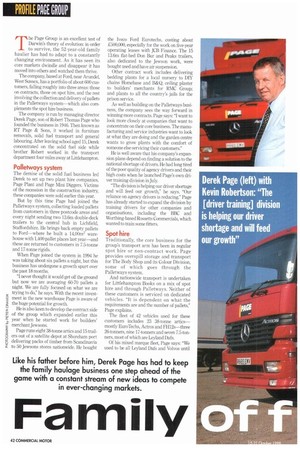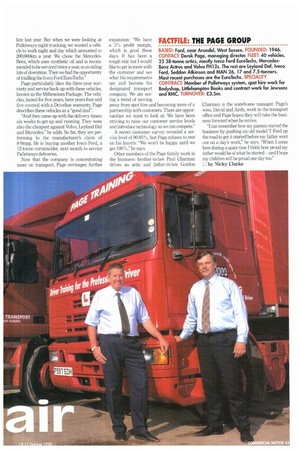Like his father before him, Derek Page has had to
Page 44

Page 45

If you've noticed an error in this article please click here to report it so we can fix it.
keep the family haulage business one step ahead of the game with a constant stream of new ideas to compete in ever-changing markets.
The Page Group is an excellent test of Darwin's theory of evolution: in order to survive, the 52-year-old family haulier has had to adapt to a constantly changing environment. As it has seen its core markets dwindle and disappear it has moved into others and watched them thrive.
The company, based at Ford, near Arundel, West Sussex, has a portfolio of about 600 customers, falling roughly into three areas: those on contracts, those on spot hire, and the rest involving the collection and delivery of pallets in the Palletways system—which also complements the spot hire business.
The company is run by managing director Derek Page, son of Robert Thomas Page who founded the business in 1946. Then known as WI' Page & Sons, it worked in furniture removals, solid fuel transport and general labouring. After leaving school aged 15, Derek concentrated on the solid fuel side while brother Robert worked in the transport department four miles away at Littlehampton.
Palletways system
The demise of the solid fuel business led Derek to set up two plant hire companies, Page Plant and Page Mini Diggers. Victims of the recession in the construction industry, these companies were sold earlier this year.
But by this time Page had joined the Palletways system, collecting loaded pallets from customers in three postcode areas and every night sending two 13.6m double-deck trailers to the central hub in Lichfield, Staffordshire. Ile brings back empty pallets to Ford—where he built a 14,00m2 warehouse with 1,400 pallet places last year—and these are returned to customers in 7.5-tonne and 17-tonne rigids.
When Page joined the system in 1994 he was taking about six pallets a night, but this business has undergone a gi owth spurt over the past 18 months.
"I never thought it would get off the ground but now we are averaging 60-70 pallets a night. We are fully focused on what we are trying to do," he says. With the recent invest Uj ment in the new warehouse Page is aware of 4 the huge potential for growth.
cc
He is also keen to develop the contract side of the group which expanded earlier this t. year when he started work for builders' f_ merchant Jewsons.
Page runs eight 38-tonne artics and 15 trail8 ers out of a satellite depot at Shoreham port .5 delivering packs of timber from Scandinavia to 50 Jewsons stores nationwide. He bought
the Iveco Ford Eurotechs, costing about £500,000, especially for the work on five-year operating leases with JCB Finance. The 15 13.6m flat-bed Don Bur and Peaks trailers, also dedicated to the Jewson work, were bought used and have air suspension.
Other contract work includes delivering bedding plants for a local nursery to DIY chains Homebase and B&Q; ceiling plaster to builders' merchants for RMC Group; and plants to all the country's jails for the prison service.
As well as building on the Palletways business, the company sees the way forward in winning more contracts. Page says: "I want to look more closely at companies that want to concentrate on their core business. The manufacturing and service industries want to look at what they are doing and the garden centre wants to grow plants with the comfort of someone else servicing their customers."
He is well aware that his company's expansion plans depend on finding a solution to the national shortage of drivers. He had long tired of the poor quality of agency drivers and their high costs when he launched Page's own driver training division in July.
"The division is helping our driver shortage and will feed our growth," he says. "Our reliance on agency drivers is reducing." Page has already started to expand the division by training drivers for other companies and organisations, including the BBC and Worthing-based Rossetts Commercials, which wanted to train some fitters.
Spot hire
Traditionally, the core business for the group's transport arm has been in regular spot hire or non-contract work. Page provides overspill storage and transport for The Body Shop and its Colour Division, some of which goes through the Palletways system.
And nationwide transport is undertaken for Littlehampton Books on a mix of spot hire and through Palletways. Neither of these customers is serviced on dedicated vehicles. "It is dependent on what the requirements are and the number of pallets," Page explains.
The fleet of 42 vehicles used for these customers includes 23 38-tonne artiasmostly EuroTechs, Actros and FH12s—three 26-tonners, nine 17-tonners and seven 7.5-tonners, most of which are Leyland Dafs.
Of his mixed marque fleet, Page says: "We used to be all Leyland Dafs and Volvos until
late last year. But when we were looking at Palletways night trunking, we wanted a vehicle to work night and day which amounted to 200,000km a year. We chose the MercedesBenz, which uses synthetic oil and is recommended to be serviced twice a year, so avoiding lots of downtime. Then we had the opportunity of ti-jailing the Iveco Ford EuroTechs."
Page particularly likes the three-year warranty and service back-up with these vehicles, known as the Millennium Package. The vehicles, leased for five years, have years four and five covered with a Driveline warranty. Page describes these vehicles as a "good deal".
"And they came up with the delivery times: six weeks to get up and running. They were also the cheapest against Volvo, Leyland Daf and Mercedes," he adds. So far, they are performing to the manufacturer's claim of 8-9mpg. He is buying another Iveco Ford, a 12-tonne c-urtainsider, next month to service Palletways deliveries.
Now that the company is concentrating more on transport, Page envisages further expansion: "We have a 5% profit margin, which is good these days. It has been a rough ride but I would like to get in more with the customer and see what his requirements are and become his designated transport company. We are seeing a trend of moving away from spot hire and becoming more of a partnership with customers. There are opportunities we want to look at. We have been striving to raise our customer service levels and introduce technology so we can compete."
A recent customer survey revealed a service level of 90-95%, but Page refuses to rest on his laurels: "We won't be happy until we get I00%," he says.
Other members of the Page family work in the business: brother-in-law Paul Charman drives an artic and father-in-law Gordon Charman is the warehouse manager. Page's sons, David and Andy, work in the transport office and Page hopes they will take the business forward when he retires.
"I can remember how my parents started the business by pushing an old model T Ford up the road to get it started before my father went out on a day's work," he says. "When I come here during a quiet time I think how proud my father would be of what he started—and I hope my children will be proud one day too."
Li by Nicky Clarke FACTFILE: THE PAGE GROUP BASED: Ford, near Arundel, West Sussex. FOUNDED: 1946. CONTACT Derek Page, managing director. FLEET: 40 vehicles. 23 38-tonne artics, mostly Iveco Ford EuroTechs, MercedesBenz Actros and Volvo FH12s. The rest are Leyland Daf, Iveco Ford, Seddon Atkinson and MAN 26, 17 and 7.5-tonners. Most recent purchases are the EuroTechs. SPECIALITY CONTRACT: Member of Palletways system, spot hire work for Bodyshop, Littlehampton Books and contract work for Jewsons and RMC. TURNOVER: E3.5m.




















































































































